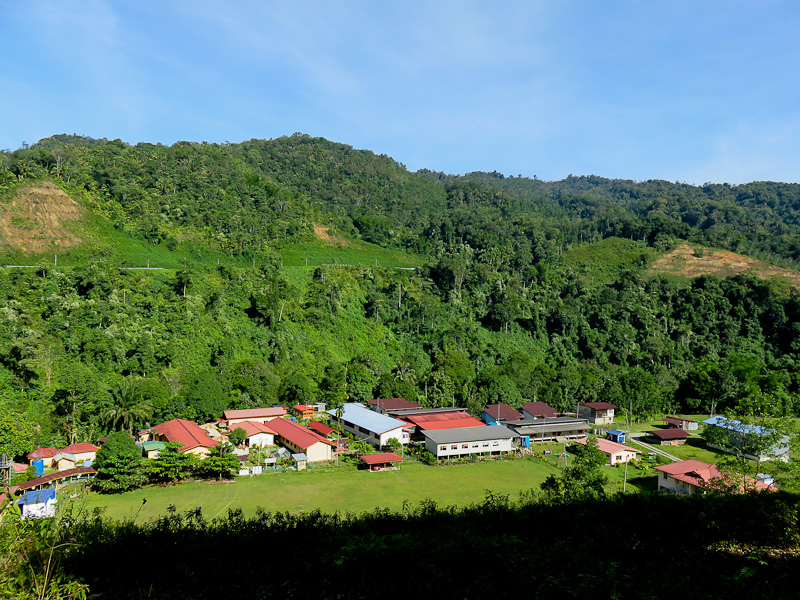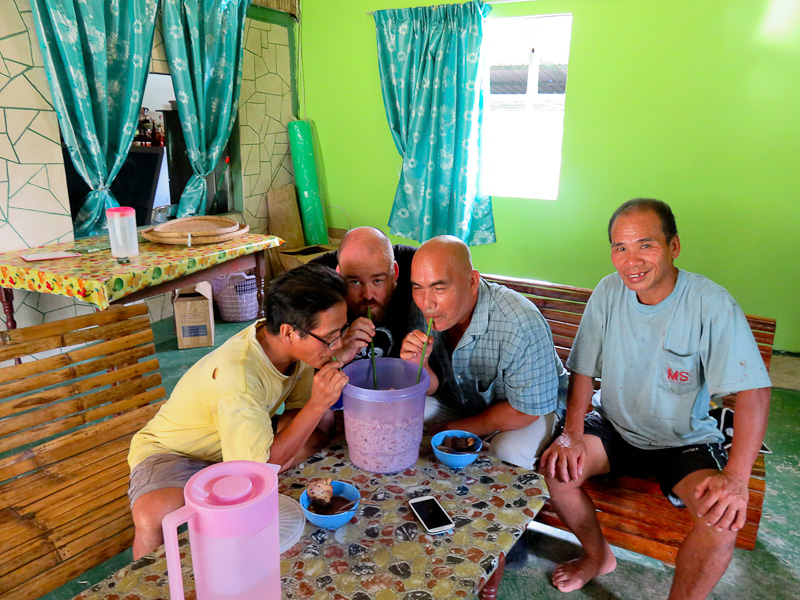Sabah Farm Stay: Conflicted Emotions
The concept of a farm stay fills me with a kind of instinctive dread.
Having been raised in the rural backwoods of Australia’s New England region, I can’t hear the word ‘farm’ without my mind being filled with images of the vacant-eyed farm boys who made my high school years so unpleasant.
The phrase conjures up images of back-breaking labour, quiet boredom, and an unwelcome detachment from the comforts that emit from the tiny smartphone that has become every bit as essential to my being as my passport and my wallet.
So, it was a with a certain sense of trepidation that I embarked on a two night Sabah Farm Stay at Kiulu Farm Stay in Malaysia.
Day One: First Impressions and being happily proven wrong
I distinctly remember a growing feeling of desperate unhappiness as the beat up old truck rattled and bounced its way down an increasingly deteriorating dirt track – the bars on my phone’s 3G gradually decreasing and then, finally, disappearing completely.
A frightened chicken fled at my arrival. I did the mental math in my head as to how many hours separated me from blessed civilization.
And then I saw it.
Like a bridge out of some teen fantasy novel, the suspension bridge acted as a kind of barrier between the real world I was leaving behind and the remarkably fascinating world that lived on the opposite side of the river.
Something remarkable happened as I made my slow, swaying way across the bridge: I cast aside my doubts and surly predisposition and I just opened myself up to the experience.
I’m so glad that I did. My time at Kiulu Farm Stay would stand out as the absolute highlight of my time in Sabah.

My accommodation for my visit would be the newly finished Fig Tree.
As you can see, it’s a traditional long house style design with a modern take on both sustainability and convenience. Built from bamboo that creaks and shifts deliciously under your bare feet, modern conveniences like comfortable double beds, hot and cold running water, and a well-equipped little kitchen make it a perfect base to explore the nearby villages and jungle.
Each night, local women would come in to whip together a delicious local feast of kampong (village) chicken, tilapia caught from the many ponds in the area, and fresh picked vegetables.

Far from being tedious affairs, my nights were filled with laughter and comfort.
Whether I was teaching my host how to play Monopoly, drinking rice wine with the locals in a dimly lit hut, or sharing stories in the riverside sulap – I would go to bed each night tired and happy.
And the sleep! I don’t think I’ve ever slept so well as those two nights in which I was lulled to sleep by the warbling river, the twittering night birds, the rustling branches, and the chirping cicadas.


The days were no less entertaining. They were also considerably more exhausting.
My first day saw us immediately heading to the local village to do a little exploration.
As we walked, we’d pluck fresh rambutans and langsat from the trees and share them between us as my two guides took turns talking to me about the local culture.

In many ways, the village reminded me of my own village in Australia. There were obvious differences, of course. My village has high speed internet and cable television, while theirs had more of a pulse. Kids played badminton in the community hall, locals sat outside and chatted, chickens and dogs raced around, and it all felt very much alive.
Unlike other tourist friendly villages I’ve visited in my travels, I didn’t find myself inundated with souvenir vendors or smiling kids asking for money.
Far from it, I was treated to reactions ranging from warm welcomes to polite indifference. It was refreshing to be able to take it in organically, rather than have it forced down my throat.


Our walk took us beyond the village and into the motley of farmsteads and dense jungle beyond. It wasn’t quite machetes out conditions, but there was plenty of ducking under low hanging branches and one-leg-dancing to get myself out of a tangle of vines.
I was taken by the enterprise on display in every farm. With land and resources limited, families don’t focus on a single crop and instead grow everything they might need. Pineapples, rice, tilapia, vegetables, chickens, and more all co-exist in the same relatively small parcels of land.

Day Two: Jungles and Marriage Proposals
My second day in the village offered a more comprehensive exploration.
Starting out bright and early after a big breakfast, we again ventured into the village to learn a bit more about the local culture.
From visits to the local cemetary (where the above panorama of the village was taken) to tight-rope walks through the heart of rice paddies to detours through farms to show off a new local innovation or experiment gone wrong, it was a pleasant way to start the day.


After a brief stop at my host’s home to meet his family and mentally prepare ourselves for the jungle trek, it was off again.
The jungle trek is not some dumbed down tourist thing. It’s a lot of slogging through ankle-deep streams, half-sliding down muddy embankments, ducking underneath thorny vines, and occasionally exhausting uphill climbs.
There are no ropes or paved paths to follow, and it’s all the more fantastic for it.

The trek itself takes about two sweaty, entertaining hours. We fill ourselves with ice cold river water and fresh fruit as we go, with my host’s dog (aptly named ‘puppy’) racing ahead of us to scout the way and ensure there are no unpleasant surprises ahead.
Along the way we forage for ingredients for the lunch we’ll cook together, occasionally stopping to snatch up fresh tomatoes or vegetables whose names escape me.
We even try our luck with the blowgun to see if we can’t bring down a bit of game.

When the trek is finished, we return to my host’s home for a big family lunch that we whip up together. I even chip in by preparing some vegetable and anchovies dish that I proclaim to be my favourite.
There’s fresh lime juice to accompany our meal, and aunts, nieces, sisters, and children all gather around the table.

It’s over lunch that my host attempts to set me up with not one, but two of my relatives.
“This is my sister,” he informs me, “She manages a hotel in Kota Kinabalu and is your age”.
When the sister blushes bright red and beats a hasty retreat, he seems to have dropped the subject.
We’re going to learn how to shell rice and separate the husks from the rice. He summons his niece.

“Future husband and wife!” he proclaims proudly as we perform the task of pounding the rice to get the husks off.
We both blush and I, assuming from Jennifer’s height that she is 12 or 13, quickly try to change the subject.
“What is your favourite subject at school?”
“Tourism management,” she replies.
“Oh, they teach that here?”
“No, they teach it at my university”.
My host cackles with delight and continues to suggest we would be a good match. His many brothers, including the girl’s father, are only too happy to continue the joke as we’re all invited to the local river for a swim where a jungle river and a mountain river meet.

The river is a lot of fun. The warm mountain water and the cold jungle water meet and mingle together, leaving one side of the river ice cold and one side bathwater warm.
The current is strong, so my host slings a rope across the river for the less strong swimmers to grab onto.
All told, there are maybe a dozen of us in the water, with all but me being part of my host’s extended family.
Continuing the joke, my host and two of his brothers continually push their 21 year old niece in my direction. We both politely decline their invitation to marry one another.
We play local variations of water games like Marco Polo, slide along the rapids on our backsides, and probably would have stayed a lot longer had the thunder not begun to boom overhead in prologue to a tropical deluge the likes of which seemed entirely fitting for our jungle setting.

My time at Kiulu Farm Stay was one of the high points of my year.
There was a kind of simple pleasure to be found in a life removed from Instagram and Facebook posts, nervously awaiting WeChat replies from the girl I was flirting with at the time, and emails from work.
We have a nasty habit of glamourising the comparative poverty of those in the developing world as some kind of simpler ideal, and I don’t want to be guilty of doing that here. Education and medical care are still very much issues in communities like this, but initiatives like Kiulu Farm Stay are going some way towards remedying that be bringing vital money into the community.

What I liked most about the experience was that, at least for now, this influx of money has not been used to cheapen the experience. There are no cheesy photo opportunities or cliched tourist traps here – just local people enriching their lives a little by enriching the lives of their visitors.
As my host put it:
“There is poverty here if you measure wealth by money. But nobody here is hungry. Nobody here is thirsty. We have all we need”.
There’s a real beauty in that sense of community – of people pulling together for the improvement of their lives.
I left Kiulu Farm Stay ashamed at my pre-judgement and warmed by their hospitality.
My visit to Kiulu Farm Stay was organised by the Sabah Tourism Board as part of their #HelloSabah campaign. All thoughts and opinions are my own.




